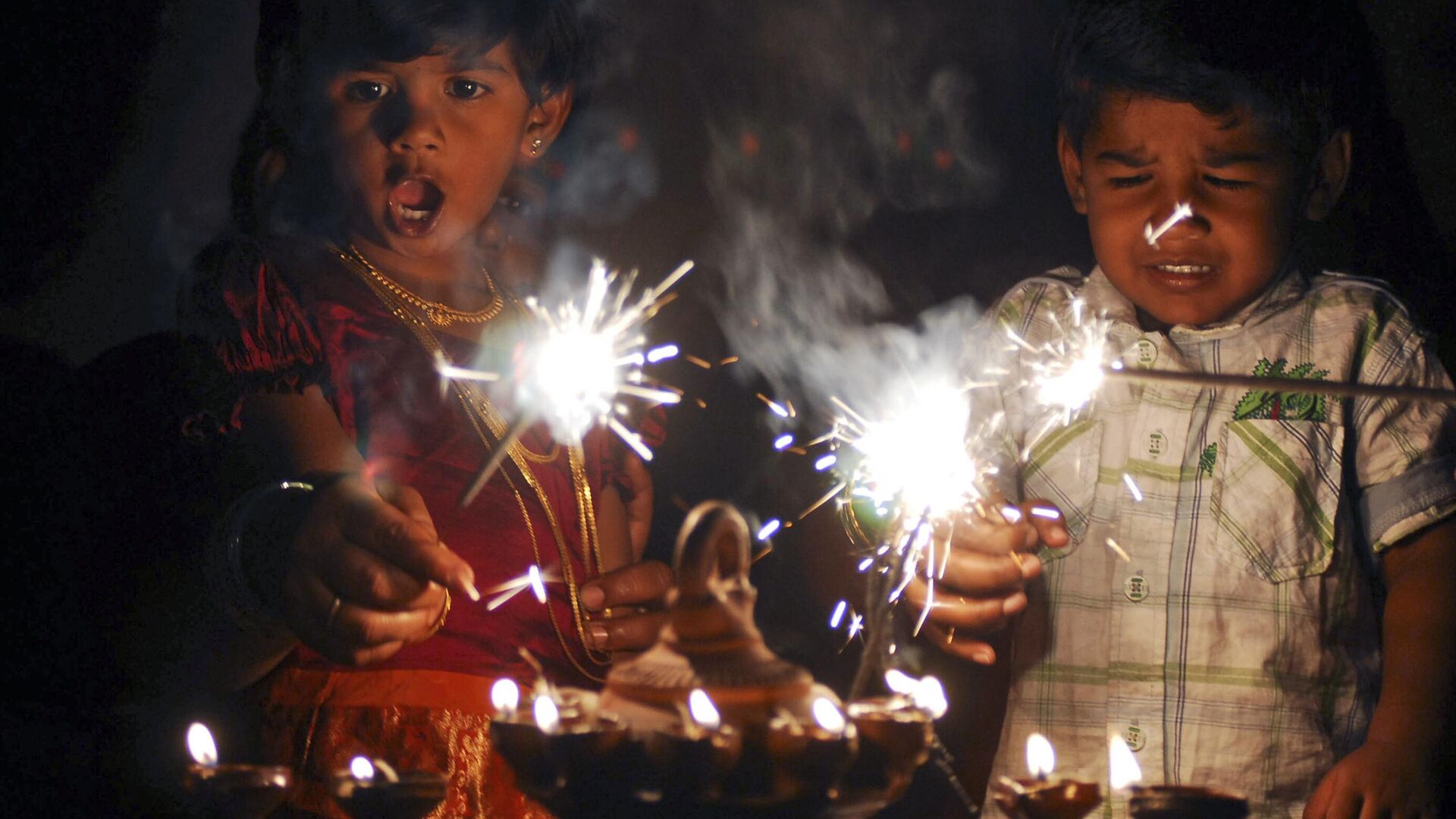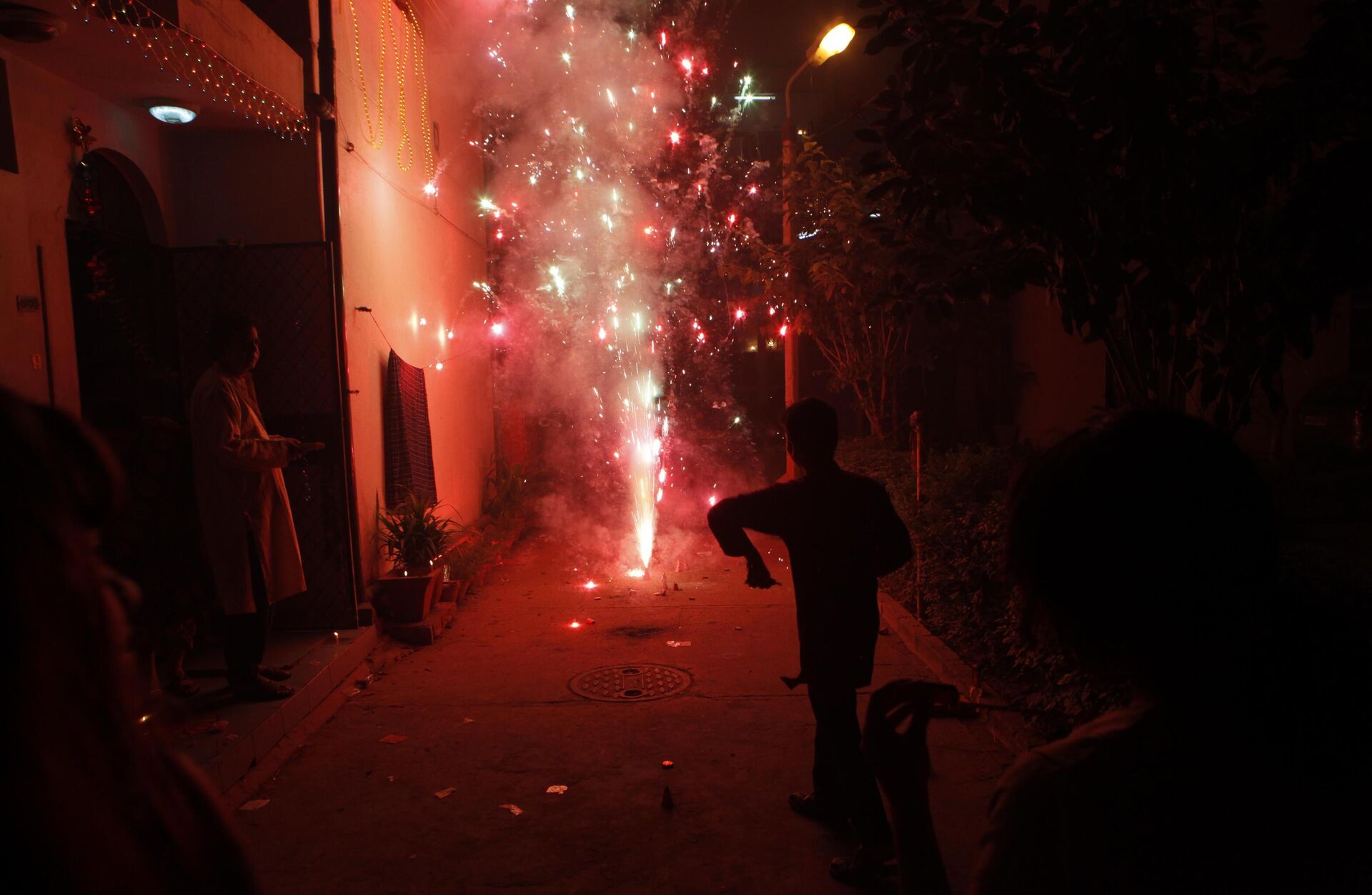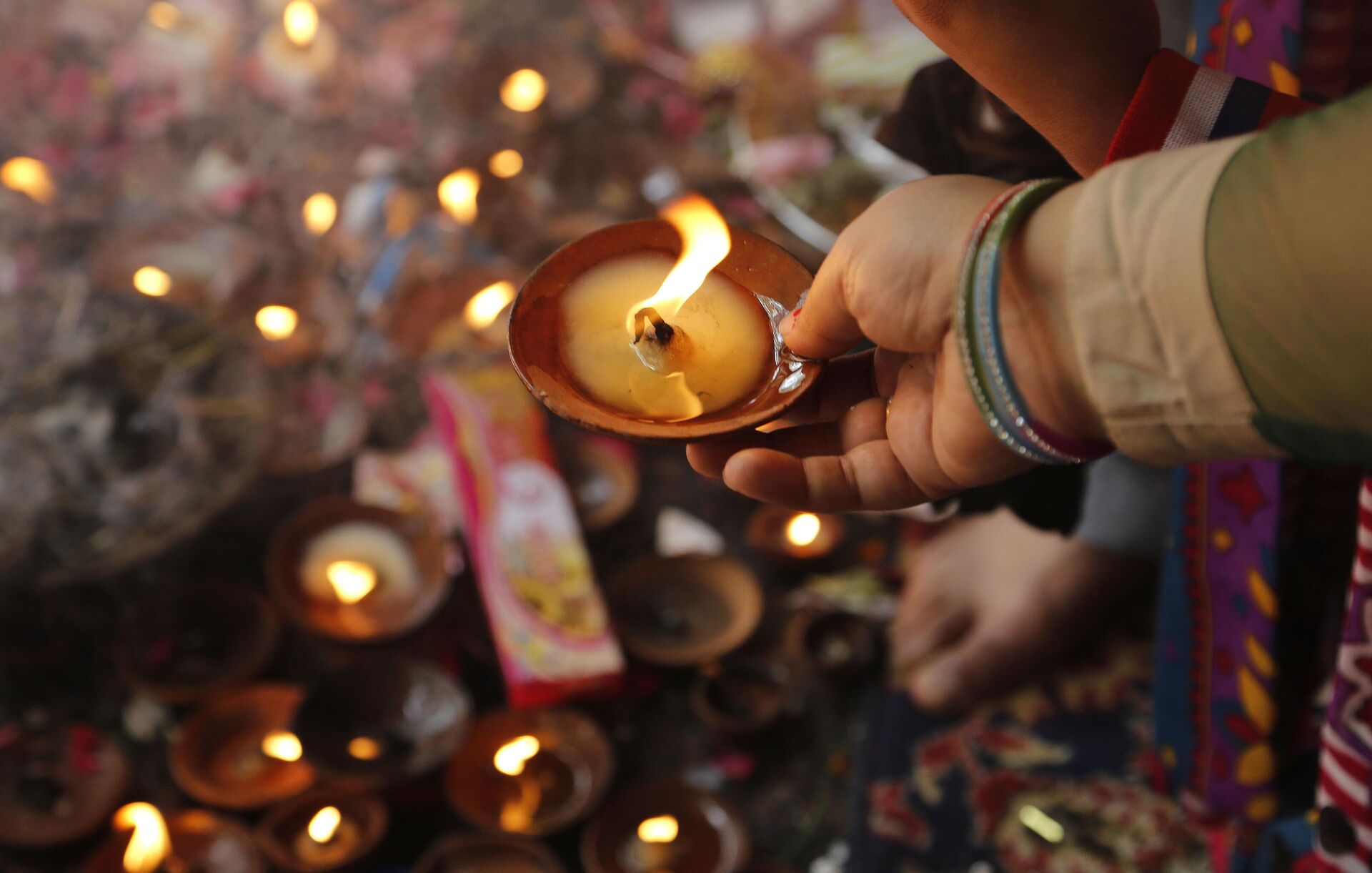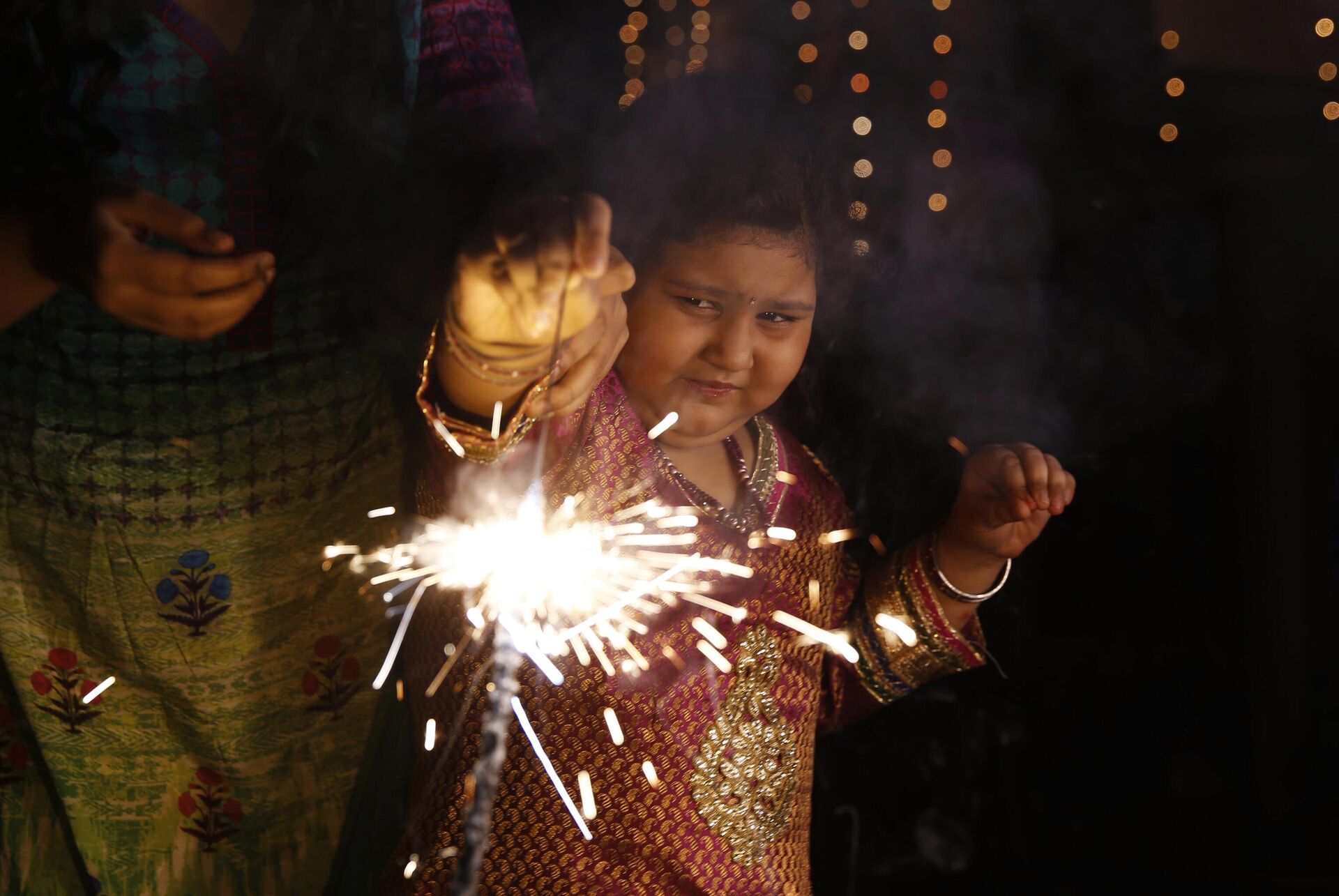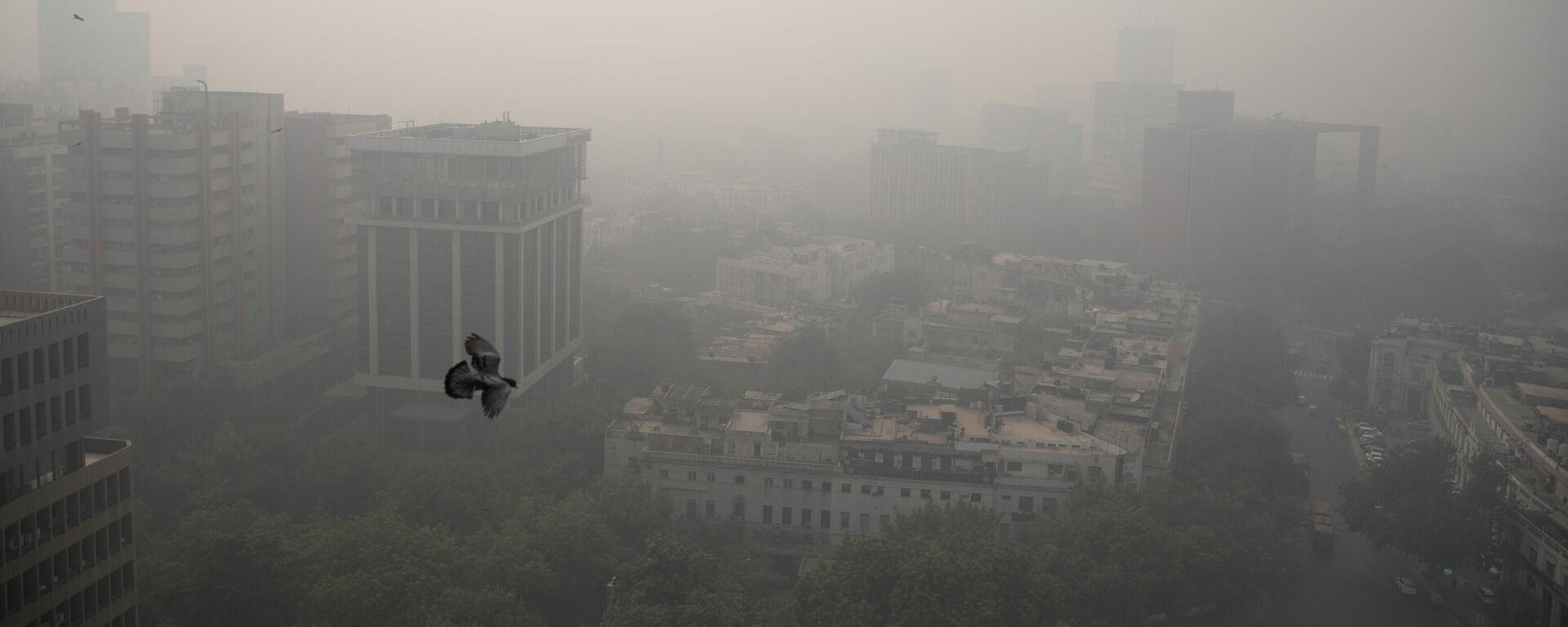https://sputniknews.in/20231104/is-firecrackers-bursting-on-diwali-the-biggest-source-of-pollution-in-delhi--5212860.html
Diwali Firecrackers: Alarming Pollution Source in Delhi?
Diwali Firecrackers: Alarming Pollution Source in Delhi?
Sputnik India
Every year just ahead of the celebrations, one of the practices that sparks off public debate is widespread cracker-bursting. Sputnik India delves into the issue to examine the reality.
2023-11-04T13:24+0530
2023-11-04T13:24+0530
2023-11-10T18:01+0530
sputnik exclusives
india
diwali
celebration
hindu
hinduism
hindu festival
water pollution
air pollution
plastic pollution
https://cdn1.img.sputniknews.in/img/07e7/0b/04/5232287_0:245:2771:1804_1920x0_80_0_0_619c8c8f5759dc2ddb48ac2181ee1c9b.jpg
It’s time for Diwali, the biggest festival of lights that will soon illuminate the cities and towns across India. People will worship Goddess Lakshmi and Lord Ganesha with deep reverence after days of preparations for this annual festival. Most of the people burst crackers as part of merriment on this occasion after Puja.A section of the people, however, contends that since fireworks create heavy pollution, they should be totally banned. But there are others who believe Diwali celebrations are incomplete without bursting of crackers as a family ritual. Sputnik India talked to people from different spheres of life to explore if the real culprit behind the worsening annual environmental problem of Delhi region is the bursting of crackers on Diwali evening or misplaced or incomplete observation. Short-lived Diwali Celebrations vs Delhi's Pollution According to well-known environmentalist Vimlendu Jha, bursting of crackers that only happen for one or two days, cannot be attributed to be the main source of pollution or the only source of pollution. He, however, feels if the WHO reports in the past suggested that pollution rises 20 times on Diwali night alone, there's need to really suspend all kinds of human activities contributing to Delhi’s ambient air. "And, from that point of view I think it’s very important that firecrackers should actually be restrained.” But, he says, "that does not mean that the pollution is not there in the rest of the time. In fact the pollution continues throughout".The environmentalist states that the main source of pollution, almost 30% of air quality deterioration, can be attributed to the vehicles - private as well as public ones. Besides almost 30 to 35% of the contribution to this pollution is from construction and demolition dust, as well as the roadside dust, he says. He says the air pollution that one is witnessing now due to stubble burning in the northern states -- mostly in Punjab and in Haryana -- that also contributes on a daily basis of around 10 to 30%. This ranges from 10% to 30% on any given day.Hindu Group VHP Objects To Religious Celebration Being Singled OutAccording to Dr Surendra Jain, Joint General Secretary of Vishwa Hindu Parishad, India's biggest Hindu group, the bursting of crackers is a symbol of celebrating Lord Rama's return to Ayodhya town after 14-year exile and his triumph over demon King Ravana."So, why do some people wish to belittle that moment of enjoyment?" he asks, while reminding about the crackers bursting on Easter and other occasions. He underlines that the fireworks are also witnessed on the New Year-eve throughout the night across the world.He says this persistent questioning about Hindu practices equals showing cruelty toward the Hindus that may harm humanity as well. "Everyone is aware nature conservation is possible only by treading the path of Hinduism.""Any attempt to suppress Hindu religious sentiment should be avoided," the VHP representative adds. Pollution Problem Too Big to be Blamed on Diwali CrackersNGO head and environment activist Sumaira Abdulali contends there are many reasons, not any single cause that is leading to the pollution problem. She feels fireworks is one of the very acute causes. "The fireworks is something we do for enjoyment. That’s the ironic part. [About] Paddy burning and all the other sources of pollution, the argument is that this has to be done because it’s part of the way people live – it’s to be done either for their crop cycle or for the construction or for something."
https://sputniknews.in/20230111/delhi-sees-seasonal-spike-in-respiratory-illnesses-amid-air-pollution-448982.html
india
delhi
punjab
Sputnik India
feedback.hindi@sputniknews.com
+74956456601
MIA „Rossiya Segodnya“
2023
Sandeep Datta
https://cdn1.img.sputniknews.in/img/07e7/04/07/1468069_0:258:1800:2058_100x100_80_0_0_3909870b82375b0693e9fd27915facc3.jpg
Sandeep Datta
https://cdn1.img.sputniknews.in/img/07e7/04/07/1468069_0:258:1800:2058_100x100_80_0_0_3909870b82375b0693e9fd27915facc3.jpg
News
en_IN
Sputnik India
feedback.hindi@sputniknews.com
+74956456601
MIA „Rossiya Segodnya“
Sputnik India
feedback.hindi@sputniknews.com
+74956456601
MIA „Rossiya Segodnya“
Sandeep Datta
https://cdn1.img.sputniknews.in/img/07e7/04/07/1468069_0:258:1800:2058_100x100_80_0_0_3909870b82375b0693e9fd27915facc3.jpg
why is delhi air quality so bad, what causes pollution in delhi, should crackers be banned, why to ban firecrackers in delhi, what are the factors of pollution in delhi, why delhi is polluted, why pollution is rising in delhi, is diwali the reason for pollution in delhi, how diwali is celebrated, who celebrates delhi, which god is worshipped on diwali, how diwali is celebrated in india, how easter is celebrated, how new year is celebrated, should crackers be banned, should eco-friendly crackers be bursted, what vishwa hindu parishad think about ban on crackers, what vishwa hindu parishad said, what environmentalist think about diwali, what environmentalists think about delhi air pollution, diwali 2023diwalihappy diwalidiwali 2023 datehappy diwali wishesdiwali wishesdiwali rangolihappy diwali imagesrangoli design for diwalidiwali kab hairangoli for diwalidiwali imagesrangoli designs for diwalidiwali wishes in hindidiwali drawingkabhi eid kabhi diwalihappy diwali wishes 2023diwali rangoli designsdiwali wishes in englishdiwali quotes2023 diwali datediwali wishes in marathidev diwali 2023diwali date
why is delhi air quality so bad, what causes pollution in delhi, should crackers be banned, why to ban firecrackers in delhi, what are the factors of pollution in delhi, why delhi is polluted, why pollution is rising in delhi, is diwali the reason for pollution in delhi, how diwali is celebrated, who celebrates delhi, which god is worshipped on diwali, how diwali is celebrated in india, how easter is celebrated, how new year is celebrated, should crackers be banned, should eco-friendly crackers be bursted, what vishwa hindu parishad think about ban on crackers, what vishwa hindu parishad said, what environmentalist think about diwali, what environmentalists think about delhi air pollution, diwali 2023diwalihappy diwalidiwali 2023 datehappy diwali wishesdiwali wishesdiwali rangolihappy diwali imagesrangoli design for diwalidiwali kab hairangoli for diwalidiwali imagesrangoli designs for diwalidiwali wishes in hindidiwali drawingkabhi eid kabhi diwalihappy diwali wishes 2023diwali rangoli designsdiwali wishes in englishdiwali quotes2023 diwali datediwali wishes in marathidev diwali 2023diwali date
Diwali Firecrackers: Alarming Pollution Source in Delhi?
13:24 04.11.2023 (Updated: 18:01 10.11.2023) Every year, just ahead of the Diwali celebrations, one popular pastime - letting off firecrackers - has prompted widespread public debate. Sputnik India examines the issue to assess the facts.
It’s time for Diwali, the biggest festival of lights that will soon illuminate the cities and towns across India. People will worship Goddess Lakshmi and Lord Ganesha with deep reverence after days of preparations for this annual festival.
Most of the people burst crackers as part of merriment on this occasion after Puja.
A section of the people, however, contends that since fireworks create heavy pollution, they should be totally banned. But there are others who believe Diwali celebrations are incomplete without bursting of crackers as a family ritual. Sputnik India talked to people from different spheres of life to explore
if the real culprit behind the worsening annual environmental problem of Delhi region is the bursting of crackers on Diwali evening or misplaced or incomplete observation. Short-lived Diwali Celebrations vs Delhi's Pollution
According to well-known environmentalist Vimlendu Jha, bursting of crackers that only happen for one or two days, cannot be attributed to be the main source of pollution or the only source of pollution.
He, however, feels if the WHO reports in the past suggested that pollution rises 20 times on
Diwali night alone, there's need to really suspend all kinds of human activities contributing to Delhi’s ambient air.
"And, from that point of view I think it’s very important that firecrackers should actually be restrained.”
Stating that there are many sources of pollution - the perennial sources of pollution - that cause the environmental crisis, Vimlendu highlights "people only get to see the pollution in the months of October-November because of weather condition".
But, he says, "that does not mean that the pollution is not there in the rest of the time. In fact the pollution continues throughout".
The environmentalist states that the main
source of pollution, almost 30% of air quality deterioration, can be attributed to the vehicles - private as well as public ones.
Besides almost 30 to 35% of the contribution to this pollution is from construction and demolition dust, as well as the roadside dust, he says.
"So between dust and vehicles and then there is biomass burning, there’s open burning of garbage... And, then there are other human activities be it the gen-sets or other industrial pollution or thermal power plants that are there in the periphery of Delhi. Together these are the main sources of pollution."
He says the air pollution that one is witnessing now
due to stubble burning in the northern states -- mostly in Punjab and in Haryana -- that also contributes on a daily basis of around 10 to 30%. This ranges from 10% to 30% on any given day.
Hindu Group VHP Objects To Religious Celebration Being Singled Out
According to
Dr Surendra Jain, Joint General Secretary of Vishwa Hindu Parishad, India's biggest Hindu group, the bursting of crackers is a symbol of celebrating Lord Rama's return to Ayodhya town after 14-year exile and his triumph over
demon King Ravana.
"So, why do some people wish to belittle that moment of enjoyment?" he asks, while reminding about the crackers bursting on Easter and other occasions.
He underlines that the fireworks are also witnessed on the
New Year-eve throughout the night across the world.
"Does anyone (environment conscious people) talk about that celebration when crackers illuminate the sky across the world?" the VHP Joint General Secretary points out.
He says this persistent questioning about
Hindu practices equals showing cruelty toward the Hindus that may harm humanity as well. "Everyone is aware nature conservation is possible only by treading the path of Hinduism."
"If any initiative is undertaken by motivating society at large, nobody opposes it. But if it's imposed, it hurts sentiments and crushes the existing belief," he states in reply to a question if eco-friendly crackers are an acceptable solution to environmental concerns.
"Any attempt to suppress Hindu religious sentiment should be avoided," the VHP representative adds.
Pollution Problem Too Big to be Blamed on Diwali Crackers
NGO head and environment activist Sumaira Abdulali contends there are many reasons, not any single cause that is leading to the pollution problem.
"So you can’t say it’s only because of fireworks only or because of paddy burning only or because of anything. It’s a cumulative effect of all," she stated on being asked if firecrackers were causing the biggest air pollution.
She feels fireworks is one of the very acute causes.
"The fireworks is something we do for enjoyment. That’s the ironic part. [About] Paddy burning and all the other sources of pollution, the argument is that this has to be done because it’s part of the way people live – it’s to be done either for
their crop cycle or for the construction or for something."
"It’s very ironic that the same thing which we think is going to help us celebrate, and we feel happy, is actually making us so sick because it’s contributing to air pollution. But, of course, firecrackers is not the only cause,” remarks the NGO Awaz Foundation's founder.
